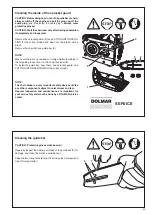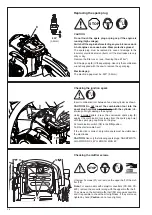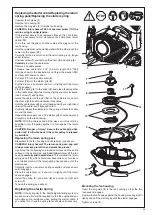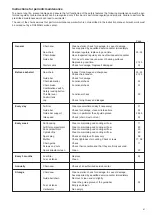
6
1
2
1
Checking the chain tension
The tension of the chain is correct if the chain rests against
the bottom side of the guide bar and can still be easily turned
by hand.
While doing so the chain brake must be released.
Check the chain tension frequently - new chains tend to get
longer during use!
When checking the chain tension the engine must be switched
off.
NOTE:
It is recommended to use - chains alternatively.
In order to guarantee uniform wear of the guide bar the bar
should be turned over whenever replacing the chain.
Retensioning the saw chain
All that is necessary to retension the saw chain is to loosen the
quick tensioner (
2
) slightly as described under “Mounting the
guide bar and saw chain”.
Tension the chain as already described.
STOP
2
4
2
Engaging the chain brake
(braking)
If the kickback is strong enough the sudden acceleration of the
guide bar combined with the inertia of the hand guard (
1
) will
automatically
actuate the chain brake.
To engage the chain brake
manually
, simply push the hand
guard (
1
) forward (towards the tip of the saw) with your left
hand (arrow ).
Releasing the chain brake
Pull the hand guard (
1
) towards you (arrow ) until you feel it
catch. The brake is now released
.
Chain brake
The PS-50 and PS-40 comes with an inertia chain brake as
standard equipment. If kickback occurs due to contact of the
guide-bar tip with wood (see SAFETY PRECAUTIONS, page 6),
the chain brake will stop the chain through inertia if the kickback
is sufficiently strong.
The chain will stop within a fraction of a second.
The chain brake is installed to block the saw chain before
starting it and to stop it immediately in case of an emer-
gency.
IMPORTANT: NEVER run the saw with the chain brake acti-
vated
(except for testing, see “Testing chain brake”)!
Doing so
can very quickly cause extensive engine damage!
ALWAYS release the chain brake
before starting the work!
















































